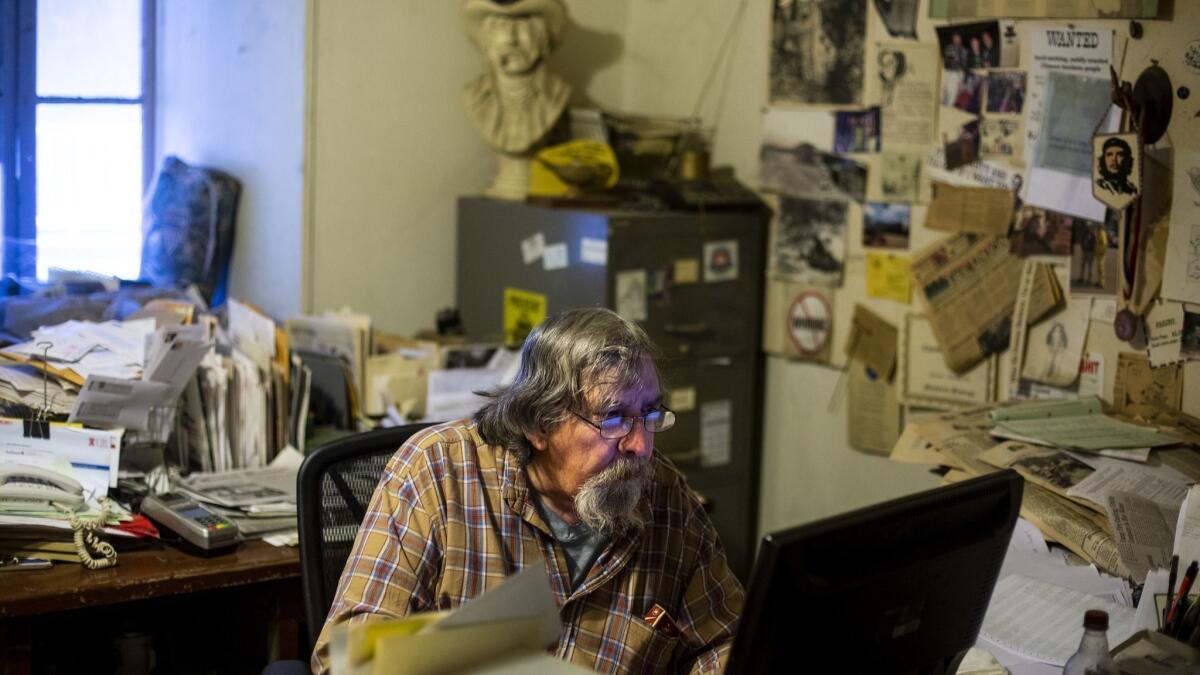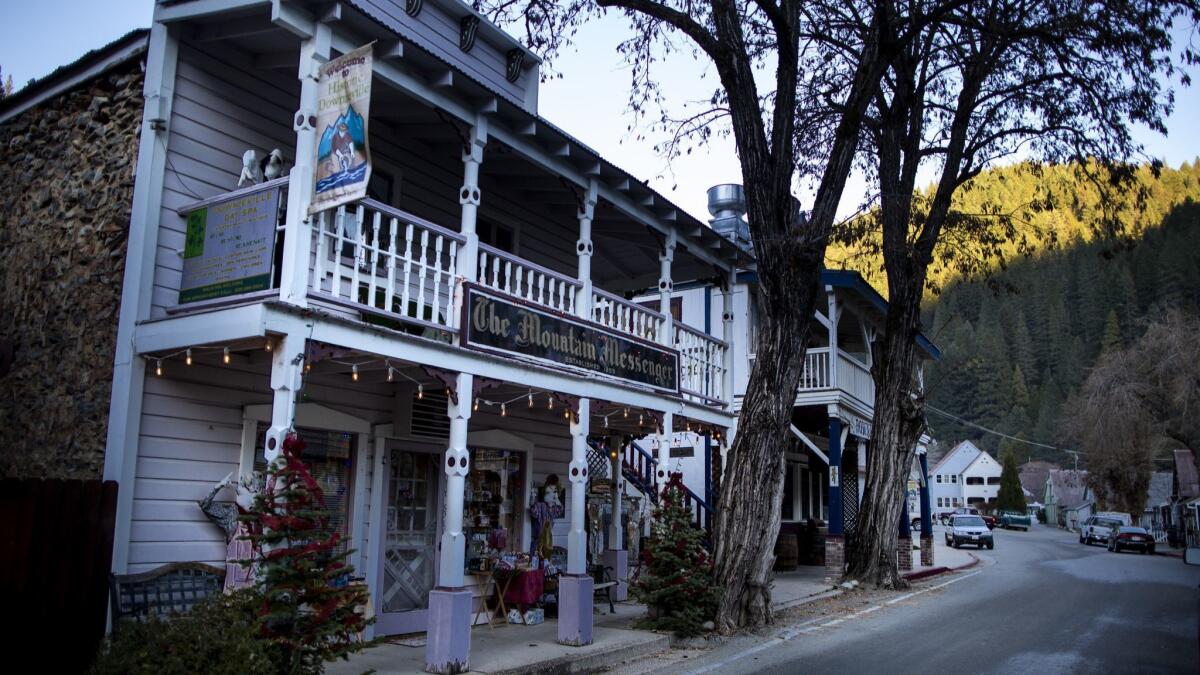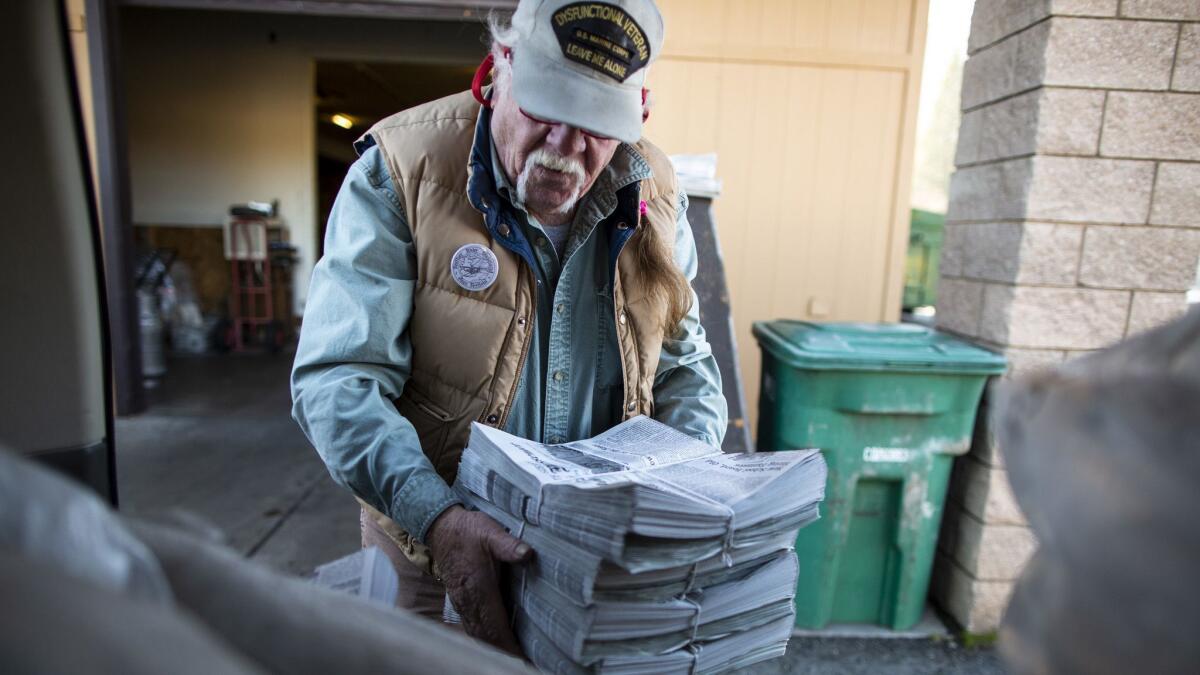Must Reads: Whether good news or bad, northern Sierra readers can always blame the Messenger

Reporting from Downieville, Calif. — The editor-publisher of California’s oldest weekly newspaper has rules for his publication: No children on the front page (“I loathe children”). No beauty pageants. No online presence. “As long as I’m running it, it’s on pulp, period,” Don Russell said.
The Mountain Messenger publishes Thursdays, so on a Wednesday, Russell, 67, sat down to write the front page. Thirty years ago this terrified him.
“But now I’m like, ‘Watch what I can do,’” he said — with the chortle of a melodrama villain and a voice as deep as the color of his favorite bourbon.
He was, however, facing seasonal difficulties.
“Everyone is terminally well-behaved from October well into January around here,” he said. “It’s hard on headlines.”
Russell covers school board meetings, federal land use and everything else in Sierra and Plumas counties — some of the most rural areas of California. His tone ranges from head-shaking to finger-pointing outrage.
He has never been sued: “If I say it’s a fact, it’s a fact, damn it. I do my homework.” But there have been a couple of times an irked politician drove around and bought all 200 copies as damage control.
A self-described contrarian, Russell uses every edition to help him prove that a small town’s strength is its common ground. He can call someone an idiot, disagree with their politics, question their good sense and still share a breakfast table or a drink.
Breakfasts are busy at the Coyoteville Cafe on Fridays, when the latest “Mountain Mess” — as many here call the paper — is first out.
“Good ol’ Don Russell, he’s quite the character. He’s so blunt and straightforward, but the funny thing is he’ll come in with someone on the same day he’s bad-mouthing them,” said Patrick Shannon, 38, who works in his mother’s cafe and as a handyman, EMT and the town’s water meter reader.
Debra Moore, managing editor of a string of newspapers in neighboring Plumas County, said that Russell comes across as a crotchety newsman but that he’s a sharp watchdog for the northern Sierra Nevada. Recently he exposed some county supervisors for double-dipping. They apologized and paid back the money.
“He has a heart of gold, but he’ll take on anyone,” she said. “He is the last and the best of his kind.”
The walls of the newsroom — where Russell simultaneously typed, smoked and readied the next day’s paper — are layered with newspaper clippings, mementos and nicotine. Several pictures of Mark Twain, the Sierra’s most famous newsman (the paper’s slogan is “Mark Twain Wrote Here”), are on display, along with photos of Russell looking like Twain, but wearing a cowboy hat.
“I am exactly like Mark Twain,” Russell said, continuing to type. “Except he was famous, talented and worked hard.”
Raised in Detroit, Russell spent summers with family in east Tennessee. The draft board called when he turned 18, but Russell didn’t answer. He figured he’d rather spend five years in federal prison than Vietnam.
No one ever showed up to arrest him, so at 20 he headed west. He learned forestry in California’s gold country. Owned a fishing boat in Alaska. Bought into a small-town newspaper.
“I’m proud that I’ve managed to avoid honest work my whole life,” he said. “I worked in the woods. I fished. And now I write.”

He hired the paper’s one other employee, Jill Tahija, after a two-question interview: “Can you type?” “Do you smoke?” She said yes to both.
She puts together the inside pages, including a chart of the previous week’s weather sponsored by Grubstake Saloon and the most widely read feature, the sheriff’s blotter. A recent highlight: “Someone in Sierra City suspected they had been scammed.”
Tahija answers the phones. Russell delivers the paper.
On a recent Thursday morning, Brutus, a 140-pound shepherd-chow-wolf mix, butted open the door to the newspaper office and walked in.
Half an hour later, Scott McDermid, Brutus’ owner, arrived to help Russell pick up the Messenger from the printer and deliver it to general stores and news racks, where it sells for 50 cents. Russell pays McDermid two cigarettes for the help.
According to McDermid, he and Russell are an unusual pair of friends.
“Peace creeps and former Marines aren’t supposed to get along, but we do,” said McDermid, who fought in Vietnam. He said it isn’t always easy for him to be around people. “Once you’ve had someone’s insides on your outsides, you’re never the same. Never.”
Their paper route took them up over Yuba Pass. The Sierra Valley spread out in panoramic splendor, carved by the same forces that raised the towering mountains.
Any weekly drive becomes routine, Russell said, but he always notices this view.
“And a couple of times a year, it is a sight beyond magnificent,” he said.
McDermid agreed: “They call it the hoarfrost, when every little blade of anything has ice sticking out like the fur on a ruffled cat’s tail. The whole valley turns into blinking lights. It’s a little bit of wonderful.”

Looping through the hills, houses are few and more than half are empty — the property of moneyed outsiders who rent them to tourists during the summer. The sawmills, logging and mining left years ago, taking most of the people with them.
There are about 3,000 residents in all of Sierra County.
“We are under no over-population pressures,” Russell said. “This is California. Here people want to visit the snow, not live in it.”
Delivery day, as always, ended in Downieville — at the St. Charles, which residents just call “the bar” because there is only one in town.
“Give me a cheap bourbon with a beer back,” Russell said. The bartender was pouring the drinks before he ordered.
Lee Adams, former Sierra County sheriff, walked through the door and made a beeline for Russell. Adams keeps a copy of a favorite front page in his wallet.
In large, black letters it screamed one word — an expletive for chicken manure.
The story is about Adams. He wouldn’t pull a deputy Russell had deemed too aggressive in patrolling Main Street.
Adams said the headline made him laugh.
“I’m relieved to hear that,” Russell said. “I always felt bad about the timing, since that was a hard time for you personally.”
It was when Adams, now the first openly gay county supervisor, first came out.
Russell didn’t find that newsworthy.
“The only person around here who didn’t know Lee was gay was Lee.”
A live-and-let-live attitude has long persisted in the mountains, Russell said, “dating back to the Gold Rush, when the world tipped and everything that wasn’t bolted ended up in California. The ones who lost everything got stuck in these hills and learned to take each other as they came.”
The next night, Russell again was at the bar — with McDermid and Jim Roos, who owns a small interest in the paper.
“He’s a Trumpster,” Russell said of Roos. “But I don’t hold being a fool against anyone but that fool, Trump.”
In a decidedly blue state, this region is as red as a painted barn. President Trump won 14 California counties by more than 10 percentage points. All of them were in Northern California and the western Sierra.
Roos and Russell conceded that their little paper makes little money, hanging on only because of income generated from running legal notices. They said it won’t survive many more years.
“We can’t pass it on because the young ones who are smart enough to run it, we like too much to do that to,” Russell said.
When the paper does close, Russell said, he just might give fiction writing a shot.
“I was told by now-dead relatives that I ought to be a writer,” he said. “I remember from a very young age taking a certain pleasure in stringing words together.”
He said his short stories would be set somewhere like Downieville. He thinks there are important things to observe about life in a small town.
Twitter: @DianaMarcum
More to Read
Sign up for Essential California
The most important California stories and recommendations in your inbox every morning.
You may occasionally receive promotional content from the Los Angeles Times.











